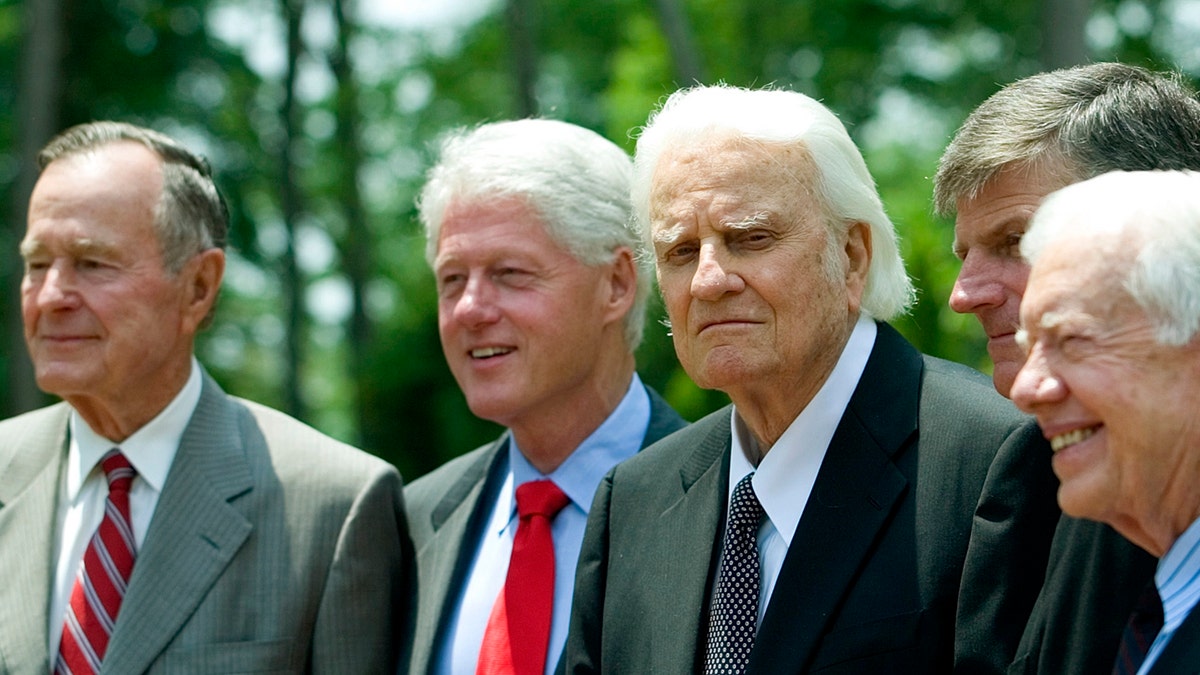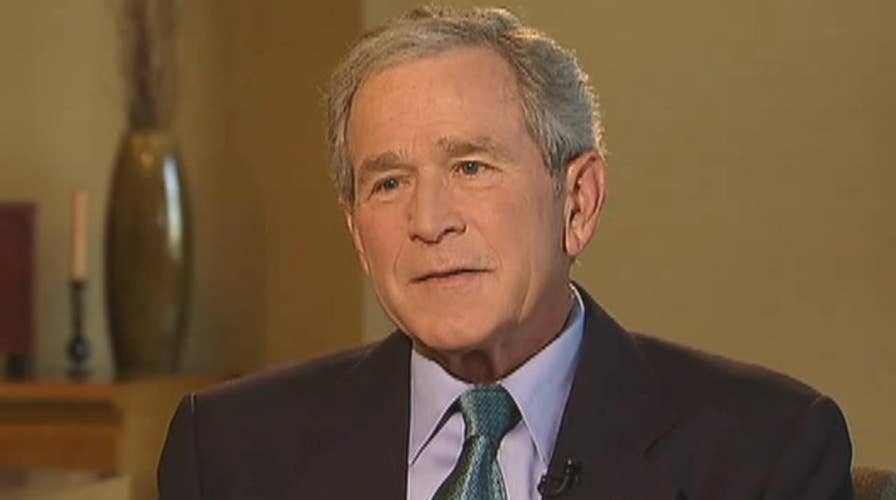Flashback: George W. Bush says Billy Graham changed his life
The former president reflects on the reverend's impact in 2010 interview.
Billy Graham was, with C.S. Lewis, one of the 20th century’s most influential figures in evangelicalism. I never had the honor of meeting Lewis, but I did know Billy, who died last week at 99. He changed my life.
I first met him on my grandmother’s porch in Kennebunkport, Maine, in 1985. In her 80s, she was frail but sharp. They sat together and Billy held her hand while talking about the Bible. Later she described it as one of the most peaceful days of her life.
Soon after, I had my own personal encounter with Billy. As I wrote in “Decision Points,” he asked me to go for a walk with him around Walker’s Point. I was captivated by him. He had a powerful presence, full of kindness and grace, and a keen mind. He asked about my life in Texas. I talked to him about Laura and our little girls.
Then I mentioned something I’d been thinking about for a while—that reading the Bible might help make me a better person. He told me about one of the Bible’s most fundamental lessons: One should strive to be better, but we’re all sinners who earn God’s love not through our good deeds, but through His grace. It was a profound concept, one I did not fully grasp that day. But Billy had planted a seed. His thoughtful explanation made the soil less hard, the brambles less thick.
He told me about one of the Bible’s most fundamental lessons: One should strive to be better, but we’re all sinners who earn God’s love not through our good deeds, but through His grace.
Shortly after we got back to Texas, a package from Billy arrived. It was a copy of the Living Bible. He had inscribed it and included a reference to Philippians 1:6: “And I am certain that God, who began the good work within you, will continue his work until it is finally finished on the day when Christ Jesus returns.”
God’s work within me began in earnest with Billy’s outreach. His care and his teachings were the real beginning of my faith walk—and the start of the end of my drinking. I couldn’t have given up alcohol on my own. But in 1986, at 40, I finally found the strength to quit. That strength came from love I had felt from my earliest days and from faith I didn’t fully discover until my later years.
God’s work within me began in earnest with Billy’s outreach. His care and his teachings were the real beginning of my faith walk — and the start of the end of my drinking. I couldn’t have given up alcohol on my own.
I was also fortunate to witness Billy’s remarkable capacity to minister to everyone he met. When I was governor of Texas, I sat behind Billy at one of his crusades in San Antonio. His powerful message of God’s love moved people to tears and motivated hundreds to come forward to commit themselves to Christ. I remember thinking about all the crusades Billy had led over the years around the world, and his capacity to open up hearts to Jesus. This good man was truly a shepherd of the Lord.
Perhaps his most meaningful service came on Sept. 14, 2001. After the 9/11 attacks, I asked Billy to lead the ecumenical service at Washington National Cathedral. It was no easy task. America was on bended knee—frightened, angry, uncertain. As only Billy Graham could, he helped us feel God’s arms wrapped around our mourning country.
“We come together today,” he began, “to affirm our conviction that God cares for us, whatever our ethnic, religious or political background may be. The Bible says that he is ‘the God of all comfort, who comforts us in all our troubles.’ ” God comforted a nation that day through a very special servant.

The late Rev. Billy Graham gathers with presidents George H.W. Bush, Bill Clinton and Jimmy Carter.
In a difficult moment, Billy reminded me—and us all—where we can find strength. And he helped us start to heal by offering three lessons: the mystery and reality of evil, our need for each other, and hope for the present and future. “As a Christian,” Graham said at the 9/11 service, “I have hope, not just for this life, but for heaven and the life to come.”
A final story: One night while dad was away on a trip during his presidency, mother and I had dinner at the White House. Eventually we got to talking about religion and who gets to go to heaven. I made the point that the New Testament says clearly that to get to heaven, one must believe in Christ. Mother asked about the devout who don’t believe in Jesus but do God’s work by serving others. She then took advantage of one of the benefits of being first lady. She picked up the phone and asked the White House operator to call Reverend Graham.
It wasn’t long before his reassuring Southern voice was on the line. He told us, as I recall, “Barbara and George, I believe what is written in the New Testament. But don’t play God. He decides who goes to heaven, not you.” Any doctrinal certitude gave way to a calm trust that God had this figured out better than I did.
Those of us who were blessed to know Billy Graham benefited from his deep convictions and personal example, his wisdom and humility, his grace and purity of heart. We knew that his life was a gift from the Almighty. And I rejoice that he is now in the company of God, whom he loved so much and served so well.
George W. Bush was the 43rd president of the United States.


